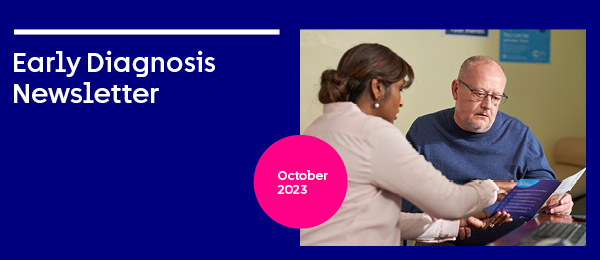 |
| Welcome to your October 2023 Early Diagnosis Newsletter.
The last few months have seen policy changes and new guidance, and within the Strategic Evidence team at CRUK, plenty of continued work towards our Manifesto for Cancer Research and Care report, which will launch at the end of November. We’ve also introduced our refreshed brand which you may have already spotted via our #MoreMoments campaign.
We’ve recently seen campaigns supporting awareness and help-seeking, from the Scottish Government's ‘Be The Early Bird’ campaign, and NHS England’s ‘Help Us, Help You’ campaign. The alignment of messaging in both campaigns, encouraging people to contact their GP with persistent, unusual symptoms, or when something doesn’t feel right, aims to encourage help-seeking, improve early diagnosis and achieve better outcomes.
We hope you’ve been keeping up to date with all the action that’s happening over on our X channel (previously known as Twitter) @CRUKHCPs. It’s been great to see many of you interacting with the resources and information we share via X. Make sure you’re following us so you don’t miss out on regular updates and information within the early diagnosis space!
Keep reading to hear more important updates and news on changes to bowel cancer screening, the use of Faecal Immunochemical Testing (FIT) in symptomatic cases, direct access guidance and exciting innovations.
Finally, don’t forget to send us your feedback on our early diagnosis newsletters, so we can continue to bring you the best content.
Thanks all,
Sam Harrison
Policy, Information and Communications Directorate at Cancer Research UK |
|
|---|
|
|---|
|
|
CRUK Early Diagnosis Conference 2024 We are thrilled to be running an in person Early Diagnosis conference in Summer 2024.This year’s conference will focus on the theme ‘Driving Evidence into Practice’. It will provide a multidisciplinary focus and showcase the latest research and innovation to those in the health service, across the whole diagnostic pathway. We are currently working on producing an exciting programme, which will be accompanied by some fascinating speakers, addressing a range of important topics within the early diagnosis space. As well as this, we will be holding a series of interactive workshops as part of the conference, giving attendees the opportunity to network and collaborate with fellow colleagues. It is also our pleasure to be welcoming abstracts for oral and poster sessions on a range of themes. We will share further details shortly. Registration will open soon so watch this space! |
|
|---|
|
|---|
|
|
| | Changes to the Cancer Waiting Time Standards NHS England have announced that from 1 October, the previous Cancer Waiting time standards in England will be reduced from 10 standards to 3. These will include the Faster Diagnosis Standard, which aims for cancer to be ruled out, or for people to receive a diagnosis within 28 days following an urgent GP referral for suspected cancer.
You can read more about the changes and our response by clicking the button below. |
|
|---|
|
|---|
|
|
| | Direct Access Guidance NHS England have released new guidance to support GPs who are making direct access referrals for specific investigations for adult patients who have concerning symptoms, but do not meet the threshold for referral to a specialist under the NICE recognition and referral of suspected cancer guidance (NICE NG12 guidance). This new guidance provides advice on direct access to chest X-ray, CT chest, CT abdomen and pelvis, ultrasound abdomen and pelvis, and brain MRI. |
|
|---|
|
|---|
|
|
 NICE Guidance updates on symptomatic use of FIT In order to reflect the latest evidence and align with other guidance, NICE have updated their guidance on the symptomatic use of FIT. FIT use is now recommended for people presenting with nearly all potential colorectal cancer symptom (as outlined in NG12), and now includes recommendations for patients aged 40-50 (previously began at age 50). |
|
|---|
|  Bowel cancer screening programme in Wales Bowel cancer screening in Wales will start to expand over the next year to include people aged 51-54. As well as this, the threshold will reduce from 150 μg Hb/g to 120 μg Hb/g. We’ve captured this in our updated bowel cancer screening good practice guide. |
|
|---|
|
|---|
|
|
| | View our updated HCP bowel cancer resources When bowel cancer is diagnosed at its earliest stage, survival is much higher compared to when it is diagnosed at a late stage (see our infographic to the left). This is why it’s been a priority of ours to make sure our bowel cancer screening and symptomatic resources are fully up to date, to reflect latest the evidence and guidance for GPs. The most recent updates include changes to the bowel cancer screening programme in Wales and NICE guidance on the use of symptomatic FIT.
See a summarised list below.
|
|
|---|
|
|---|
|
|
| | Lung Cancer Insights Guide We have recently updated our lung cancer insights guide for health professionals in England and Wales. This helpful 2-pager covers guidance for health professionals on recognition and referral, including safety netting, and information on lung cancer in never smokers. Make sure you click the button below to give it a read. |
|
|---|
|
|---|
|
|
 Artificial Intelligence and skin cancer NICE have launched a new Early Value Assessment pilot, looking into the use of Artificial Intelligence (AI)-based technologies in reducing unnecessary referrals, and prioritising people on long waiting lists in dermatology. The NICE Health Technology Evaluation Programme aims to assess the clinical and cost effectiveness of AI-based technologies used to assess suspected skin cancer in skin lesions, and to make recommendations on their use in the NHS. For further information, click the button below. |
|
|---|
|  Breast cancer screening commissioned workstream The National Institute for Health Research (NIHR) Health Technology Assessment Programme is accepting Stage 1 applications for a commissioned research project looking into the use of AI for image interpretation in breast cancer screening, with an emphasis on clinical and cost effectiveness. Applications close on 15 November. To find out more, please click the button below to find the commissioning brief itself, as well as support if you wish to submit an application. |
|
|---|
|
|---|
|
|
| | NIHR & OLS funding opportunity The NIHR and the Office for Life Science (OLS) are inviting funding applications for research projects in the early diagnosis of cancer. The call aims to support the clinical validation and evaluation of breakthrough technologies that can advance early cancer detection and/or target health inequalities in stage of cancer diagnosis. Applications are now open and the deadline is 12 December. For more details and eligibility criteria, click the button below. |
|
|---|
|
|---|
|
|
 Thank you for reading our Early Diagnosis Newsletter. To help us improve please tell us what you think using the feedback form here.  |
|
|---|
|
|---|
| | | The Strategic Evidence Team |
|
|---|
| |
|---|
|
|
| Contact the Strategic Evidence team here. |
|---|
| |
|---|
|
|
|